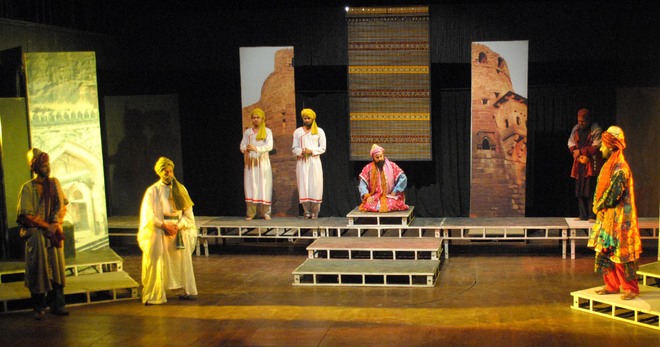Tribune News Service
Amritsar, October 27
Connecting the Satnami revolt of 1672 to the recent farmer’s agitation in Punjab, the Punjabi play 'Kachi Garhi' presented by Kewal Dhaliwal’s Manch Rangmanch at Punjab Natshala attempted to underline the suppression of rural masses by the rulers and then political system and the subsequent backlash.
Tracing the origin and culmination of the historic Satnami revolt of 1672, one of the earliest sects founded around the Narnaul area of Haryana by Udo Das, a follower of Kabir, the costume drama chronicled the revolution by farmers at the time against the Mughal ruler, Aurangzeb. Directed by Kewal Dhaliwal and based on a play written by Swarajbir, ' Kachi Garhi' (meaning mud fortress) symbolised the movement as a clash between the formidable Red Fort and the humble mud fortress built by the Satnami sect.
“Udo Das, revered as Satguru, Guru, Miharbaan Sahib and Fakir Sahib by his followers, led the Satnami revolt against the suppression of the rural population by Aurangzeb through heavy taxation and a dictatorial regime. Fiercely opposed to idol worship and subjugation of his fellow beings, he rallied the people of all castes around him to fight the resourceful military of Aurangzeb, even succeeding in getting them to retreat. Eventually, the Satnamis were crushed and wiped out by the Mughal force, yet they are remembered for their determination and courage to initiate one of the earliest agrarian uprisings,” said Dhaliwal.
The period drama performed by 27 artistes associated with Manch Rangmanch was received well by the audience and the rich costumes reflected the grandeur of the Mughal era as well as the contrasting modest rural life of the time. The play also gave a brief reference to the Jat revolt and the Sikh revolt that followed and culminated with the execution of Udo Das in Delhi. “He was publicly executed in 1669 in the Kotwali of Chandani Chowk , Delhi, by a royal decree issued by Aurangzeb. The execution was ordered due to the killing of Kazi Mukaram, son of Qazi-ul-Quzat Kazi Abdul Wahab, the chief Qazi of the empire. Udo Das preached that no religion or sect is above humanity and that there is not better weapon than your own two hands. This play is inspired by the stories of valour and standing up for equal rights by people, who are connected to the roots and farmers, who feed us,” said Dhaliwal, who is also an expert in theatre history. Another show of the play will be staged on Wednesday at Punjab Natshala.
Unlock Exclusive Insights with The Tribune Premium
Take your experience further with Premium access.
Thought-provoking Opinions, Expert Analysis, In-depth Insights and other Member Only Benefits
Already a Member? Sign In Now











